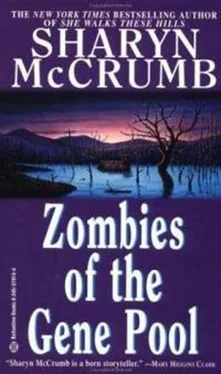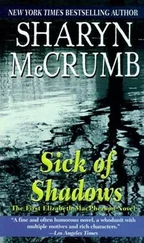Sharyn McCrumb - Zombies of the Gene Pool
Здесь есть возможность читать онлайн «Sharyn McCrumb - Zombies of the Gene Pool» весь текст электронной книги совершенно бесплатно (целиком полную версию без сокращений). В некоторых случаях можно слушать аудио, скачать через торрент в формате fb2 и присутствует краткое содержание. Жанр: Детектив, на английском языке. Описание произведения, (предисловие) а так же отзывы посетителей доступны на портале библиотеки ЛибКат.
- Название:Zombies of the Gene Pool
- Автор:
- Жанр:
- Год:неизвестен
- ISBN:нет данных
- Рейтинг книги:3 / 5. Голосов: 1
-
Избранное:Добавить в избранное
- Отзывы:
-
Ваша оценка:
- 60
- 1
- 2
- 3
- 4
- 5
Zombies of the Gene Pool: краткое содержание, описание и аннотация
Предлагаем к чтению аннотацию, описание, краткое содержание или предисловие (зависит от того, что написал сам автор книги «Zombies of the Gene Pool»). Если вы не нашли необходимую информацию о книге — напишите в комментариях, мы постараемся отыскать её.
Zombies of the Gene Pool — читать онлайн бесплатно полную книгу (весь текст) целиком
Ниже представлен текст книги, разбитый по страницам. Система сохранения места последней прочитанной страницы, позволяет с удобством читать онлайн бесплатно книгу «Zombies of the Gene Pool», без необходимости каждый раз заново искать на чём Вы остановились. Поставьте закладку, и сможете в любой момент перейти на страницу, на которой закончили чтение.
Интервал:
Закладка:
She identified herself now as Surn's assistant. Perhaps some of them thought she was his daughter. She looked quite young, with her sexless body and her dark hair worn flower-child long. She had sad brown eyes in a dreaming face, and no one would ever mistake her for a bimbo, the human furniture for the rich man's beach house. She was not that. Surn seemed to take her presence for granted, but sex did not appear to be one of his physical needs anymore. Even when she bathed him, he gave no sign of arousal. He had never even asked her name.
She looked again at the telephone, wondering what she should say. Most of the decisions were easy: Yes, you can reprint that, or please add a jar of coffee to the grocery order. But this was different. Would Surn want to go to Tennessee to see his old friends? Could he handle it?
It wasn't a decision that Lorien Williams wanted to make. She thought she'd better try to make him understand about the call. She knelt down beside his deck chair and touched his arm to rouse him from his reverie. "Brendan?" she said softly. At first she had called him Mr. Surn, but it seemed silly to be so formal with someone who could not even fry an egg. Now she thought of him as two people. There was Mr. Surn the great writer, and Brendan, the sweet, childlike man who needed her so much.
He blinked once or twice, as if he had been asleep. "Yes, Lori?"
"There's a man on the telephone who says to tell you that his name is Bunzie." A note of awe crept into her voice. "It's really Ruben Mistral, from the movies."
Surn nodded. "I know Bunzie," he said softly.
"He's calling about the Lanthanides." Lorien had read the biography of Surn, so she knew about his early years on the Fan Farm. "They're having a reunion back in Wall Hollow, and he wants to know if you would like to go. It's in Tennessee," she added, in case he had forgotten.
"Yes," said Surn in his mild, dreaming voice. "I know Bunzie. I'd like to see him again. Will Erik be there?"
"I don't know," said Lorien. She had not asked for details. "I can find out more about it now. I just wanted to see if you were interested in going."
"And Pat. Will he be there? Pat Malone?"
"I don't think so, Brendan," she said, patting his arm. Pat Malone had been dead for a long time. Everybody knew that.
On one side of Ruben Mistral's weekly engagement calendar there was an astronomer's photo of the Horseshoe Nebula, a billion pinpoints of light making a haze in the blackness of space.
Under the picture, Mistral had written: "This scene represents the number of meetings I attend per year!"
"Damn it!" he thought. "It's almost true." The many components of his film and publishing empire required considerable maintenance. He could delegate the day-to-day chores, but he supervised his underlings closely. After all, it was his money and his reputation on the line. The next few weeks of his datebook looked like a timetable for the Normandy invasion; nearly every damned hour was filled. When did they expect him to write? They didn't, of course. These days he had rewrite men and assistant screenwriters and a host of other flunkies to see that his barest idea was transformed into a two-hour movie. But Bunzie missed the old days, and the seat-of-the-pants style of production: the days when he was "Bunzie" instead of "Ruben Mistral." Being a Hollywood mogul had seemed like a wonderful dream in those far-off days; too bad reality never lived up to one's expectations. Bunzie, clad in a red designer sweatsuit and matching Reeboks, was pedaling away on the exercise bike in the corner of his office. He hated it, but it kept his doctor happy. He was supposed to be able to think "creative thoughts" while he exercised, but his brain wouldn't stay in gear. Instead of considering his current project, he looked appraisingly at his chrome and glass office, decorated with posters from his hit movies. He had probably spent more to furnish that office than poor old Woodard had spent for his house in Maryland. So, he told himself, life wasn't perfect, but he shouldn't kvetch. He was successful. The money was certainly okay; he still had his hair and his teeth; and his health was good thanks to the diet and exercise, every minute of which he hated. But, he thought, at his age, who had any fun anyhow? Better he should be rich and fit and miserable than poor and fat and miserable.
He looked up at the large framed photograph above his desk, as he usually did when the word "poor" entered his head. Most people thought that the picture of the blue mountain lake, nestled among green hills was a soothing landscape, a device to relax him like the crystals on his desk, but for Ruben Mistral the lake picture was a memorial to the days when he could relax. It was the only picture he had of Wall Hollow, Tennessee. It had been taken years after the guys left the Fan Farm, but he knew that somewhere under that expanse of green water lay his youth.
Bunzie forced himself to keep pedaling the damned exercise bike. That was the story of his life, wasn't it? Keep pedaling. Maybe everybody else was willing to give up, willing to take no for an answer, and willing to settle for less, but not Ruben Mistral. Mistral would have the best for himself, and he would demand the best from himself and from everyone he worked with.
After all these years, Bunzie still felt schizophrenic about his two identities. In the Wall Hollow days, he had dreamed of becoming Ruben Mistral-rich and famous-and several decades later, that person certainly did exist in all the imagined glory of Bunzie's daydreams. But inside that tanned and calorie-controlled body, the old Bunzie still existed, too. Science fiction legend Ruben Mistral bought two-thousand-dollar suits; Bunzie the fan from Brooklyn saved paperclips from the business letters he received. Mistral had discreet affairs with starlets whose year of birth coincided with his age; Bunzie secretly preferred Alma Louise, his wife of thirty years. Mistral was a tiger shark who could smell blood in a business deal a mile away; Bunzie missed his old pals from Dugger's farm.
Most of the time, Bunzie felt that he was a flunky who worked for Ruben Mistral; the great man never did the actual scutwork of writing, or editing scripts. That was Bunzie. Mistral was the glad-hander in Beverly Hills; the maven of the talk shows; the one with a thousand associates, contacts, and employees, but no friends. Bunzie had once had friends. Mistral had his business cronies and, now that the movie versions of his books had made him a celebrity, he had "people," those who were paid to like him, and paid to keep anyone else from ever getting close to him. Mistral was cold company for a nice guy like Bunzie. He was necessary though; Bunzie had to admit that. The cold and brilliant Ruben Mistral made merciless deals, paid all the bills, and he enabled Bunzie and Alma to live in a beautiful house in Topanga Canyon. He even tossed a few scraps to worthy charities from time to time. Not a bad guy by the local lights. He made so much money that he could afford to endow a hospital ward. What could good-hearted Bunzie have done without the ruthless Mistral ambition: give quarters to panhandlers? Bunzie knew that if there ever came a time when irreconcilable differences forced one of them to depart from the body for good, it would be Bunzie, not Mistral, who would have to go.
Still, in the brief periods of solitude when Mistral's presence was not required, Bunzie thought back on the old days with nostalgia and regret. If you were a true pal, he told himself, you'd have taken your buddies with you to the Promised Land.
"But I tried," said Bunzie to himself-or rather, to Ruben Mistral, who was sneering as usual. "Didn't I try to get Woodard to go to that Worldcon in the sixties and meet some people? Editors buy stuff from people they know, I told him. But he couldn't take the time off work, he said. And didn't I tell Stormy everything he needed to know about promotion, so that he could make a name for himself with his book? But, oh no, he wanted to be a college professor, and college professors are above that sort of merchandising." On the exercise bike, Bunzie kept pedaling. He had tried to help the old gang; not that some of them needed it. Surn was. a legend, and Deddingfield had been the richest required-reading author he knew. As for the others, he figured that there were some people who could not even have greatness thrust upon them. But he had tried. And sometimes, when Mistral was too busy to sneer at what a bunch of woolly-headed losers they were, Bunzie missed them.
Читать дальшеИнтервал:
Закладка:
Похожие книги на «Zombies of the Gene Pool»
Представляем Вашему вниманию похожие книги на «Zombies of the Gene Pool» списком для выбора. Мы отобрали схожую по названию и смыслу литературу в надежде предоставить читателям больше вариантов отыскать новые, интересные, ещё непрочитанные произведения.
Обсуждение, отзывы о книге «Zombies of the Gene Pool» и просто собственные мнения читателей. Оставьте ваши комментарии, напишите, что Вы думаете о произведении, его смысле или главных героях. Укажите что конкретно понравилось, а что нет, и почему Вы так считаете.












